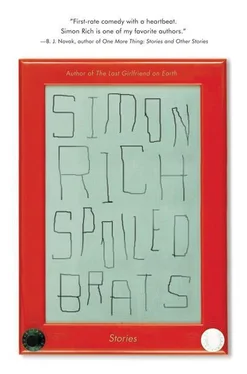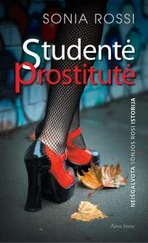Ms. Hutson starts the day with a geography lesson. She spends ten minutes explaining the concepts of north, south, east, and west. Then she asks the class which country is “north” of the United States. The children stare up at her, completely baffled. Eventually, Jeffrey raises his hand. “Mexico?” he guesses. The teacher smiles at him encouragingly. “Almost!” she says. I watch in stunned silence as she hands the little moron a sticker, as a reward for “trying his best.”
“What do we say,” Ms. Hutson asks her other students, “when someone tries their very best?”
The children smile and break into a chant.
“That’s all right, that’s okay, we still love you anyway!”
I vomit bile onto my own legs. I’ve heard a lot of treacle in this classroom, but this new cheer is so cloying it pushes me over the edge.
The children continue to chant, their voices growing louder and more confident. It’s no wonder they’re such monsters. They’ve been taught that they’re infallible, as perfect and blameless as gods.
You forgot to feed the hamsters? And brought about their deaths? That’s all right, that’s okay. We still love you anyway.
2:30 p.m.
During snack time, Simon and three other obese boys have a milk-drinking contest. It’s hard to watch as they gorge themselves just inches from my starving children’s faces.
Mr. T has begun eating newspaper to dull the pain in his stomach. My other sons sleep all day to conserve energy. For the first two days of our ordeal, I fantasized constantly about food. I hallucinated mounds of grain, piles of nuts, and luscious chunks of apple. Lately, though, I’ve stopped feeling hungry at all. It’s as if my body has given up and braced itself for death.
Teddy wins the milk-drinking contest by downing seven cartons. He immediately throws up.
Ms. Hutson sends him to the nurse and calls for Carlos, the janitor. He arrives within seconds, carrying a tattered mop.
“Hola!” the children shout in unison.
Carlos is a native English-speaker, but the little racists assume that he is foreign-born.
“Hola,” Carlos says.
“I need you to take care of something,” Ms. Hutson tells him, gesturing at the pile of vomit.
Carlos nods and gets to work. He’s still scrubbing twenty minutes later when the final school bell rings.
“Adios!” the children shout as they run by him. “Adios!”
“Adios,” he says, his eyes on his work.
Ms. Hutson peeks over his shoulder, her skinny arms folded across her chest.
“Are you going to disinfect the area?” she asks. Carlos forces a smile. He has already begun to disinfect the area but does not want to contradict her.
“Yes, ma’am,” he says.
“I don’t want that smell hanging around.”
“Of course, ma’am.”
When all the children are gone, she puts on some lipstick and changes into a pair of high heels.
“My dad’s making me see opera,” she complains.
Carlos nods awkwardly, unsure of how to respond.
“Don’t forget to disinfect the area,” she repeats on her way out.
Carlos finishes mopping and then walks from table to table, cleaning up after the fat beasts. The Jobs Board is a total farce, I think as he sponges up their filth. Kristen and Sophie are Table Wipers in name only. At the end of the day, every job on the board belongs to Carlos. The only exception is Line Leader, which of course is a privilege that he will never get to enjoy.
Carlos looks at our cage and curses at the sight of all our feces. I avert my eyes with shame. I know we’re not responsible for our prison’s deplorable condition, but it’s hard not to feel mortified.
As Carlos collects our soiled newspaper, I notice he has several tattoos on his forearm: a few cursive names and a large, ornate crucifix. I, too, am a Christian, although lately I’ve struggled to make sense of God’s plan. I wonder if Carlos’s faith is as battered as mine.
He refills our water bottle, and for the first time in days, I allow myself to feel hope. Before he can find our feed bag, though, Principal Davenport runs into the room.
“Carlos, there you are! A fifth grader shat himself in dance. Would you please take care of it?”
Carlos forces another smile and reaches for his mop.
“Of course, sir.”
The principal gives him a thumbs-up.
“Gracias!”
Wednesday
10:45 a.m.
The water tastes so rich, it brings tears to my eyes. As I drink it, I can feel it coursing through my body, giving my parched veins life. I look over at my sons, asleep in their clean cage, their wet little noses twitching with contentment. Carlos has saved our lives. But for how long?
Mercifully, the children are gone this morning. They’ve been given a break from their arduous studies to enjoy a field day at Randall’s Island.
The classroom is blissfully quiet until lunchtime, when the hobgoblins return. Their flabby red faces are streaked with grime and sweat. The smell is almost unendurable. Every child, regardless of fatness, has somehow won an athletic award.
“Boom shaka laka!” Simon shouts as he thrusts his golden prize over his head.
When he walks by my cage, I peek at the engraving on his trophy. PARTICIPATION, it reads. I wonder if Simon is aware that his trophy has no meaning, that all he participated in was a mass delusion.
“Great job, everybody,” Ms. Hutson says. “That was some great teamwork today.”
“Whatchu talkin’ ’bout, Willis!” Simon says, and everyone laughs, including Ms. Hutson.
The children spend the afternoon playing with their awards. Simon comes up with the ingenious gag of holding his trophy in front of his groin, in an imitation of an adult penis. The other boys applaud him and rush to follow his example. The girls, meanwhile, busy themselves making “outfits” for their trophies out of construction paper. Ms. Hutson encourages this madness, passing out glue and jars of glitter.
Finally, at 3:15 p.m., the nannies come to take the creatures away.
“Don’t forget to do your jobs!” Ms. Hutson cries. Simon doesn’t even look in our direction. This makes three days straight without food. It’s official: we are going to starve to death.
I glance at my sons. Their bodies still have breath, but I can see that something else has died inside them. Mr. T hasn’t moved in hours. And this morning I caught Whopper leering at him with a look I wish I could block out of my mind. Taboos are breaking down. If food doesn’t come soon, I know, we’ll have to make our own.
Thursday
8:10 a.m.
As another hellish day begins, I gather my sons around me. I’ve rehearsed my speech all night, but it’s still hard to utter the words. Eventually, with painful effort, I manage to force the terrible edict through my lips.
“If Simon forgets to feed us one more time… I want the three of you to eat my body.”
Mr. T breaks down and weeps. But Big Mac and Whopper merely nod.
They know it’s the only solution we have left.
I can hear Simon’s voice before he enters the classroom, as piercing and abrasive as a siren.
“Whatchu talkin’ ’bout, Willis!”
His use of this catchphrase has spiked in recent days. It no longer elicits the laughter it once did. In response, Simon has taken to screaming the slogan at full voice in the mad hope that volume might somehow restore the gag’s appeal.
“Whatchu talkin’ ’bout! Whatchu talkin’ ’bout! Whatchu talkin’ ’bout!”
He presses his face against the bars of our cage and chants the phrase, again and again, until the words bleed together and begin to lose their meaning. His noxious Doritos breath engulfs me, and I can feel the fury mounting in my chest. I think of the sound of my son weeping and the look my wife gave me as the last bit of life left her eyes.
Читать дальше












